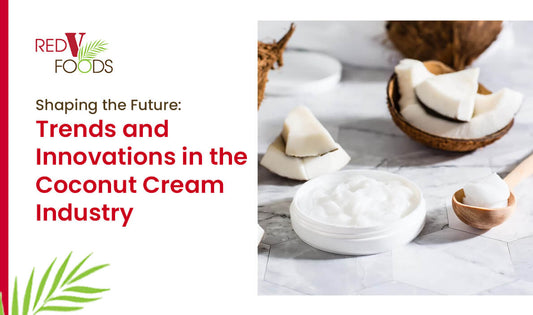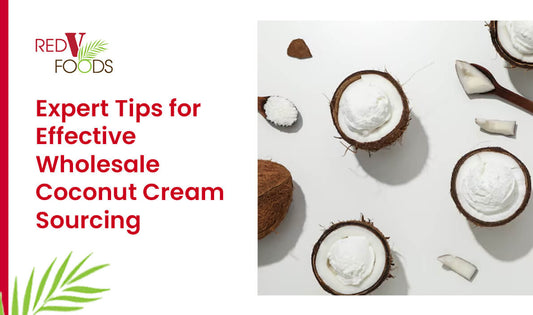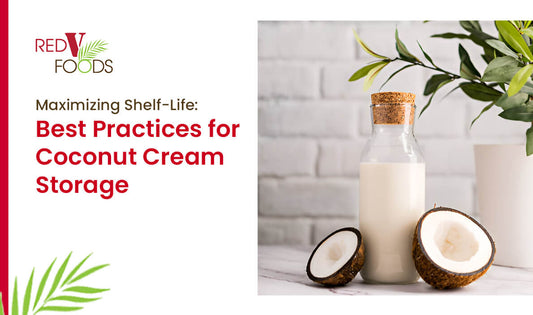- Coconut cream, due to its high water and fat content, is highly susceptible to spoilage. Proper storage practices, including refrigeration and freezing, are essential to maintain its flavor and quality
- Temperature, humidity, and packaging play key roles in the shelf-life of coconut cream. Unopened coconut cream can be stored at room temperature, but once opened, it should be refrigerated.
- Advances in packaging technology, such as aseptic packaging and multi-layer pouches, help extend the shelf-life of coconut cream by creating barriers against oxygen, moisture, and light.
- Red V Foods provides premium coconut cream products that are packaged using advanced techniques to preserve freshness and extend shelf-life.
Coconut cream, known for its rich texture and distinct flavor, is a staple in both home kitchens and the food industry. However, its high water content, combined with its fat-rich composition and low acidity, makes it highly susceptible to spoilage.
Without proper storage, coconut cream can quickly lose its flavor, develop safety concerns, and have a shortened shelf-life. To maintain its quality and prevent waste, it is essential to follow recommended storage practices.
This article outlines the ideal storage conditions and packaging techniques that help extend the freshness of coconut cream.
Related Article: What is Coconut Cream? Definition, Types, History, and Nutritional Value
Factors That Impact the Shelf-Life of Coconut Cream
The shelf-life of coconut cream is influenced by various factors that can significantly affect its quality and usability. Here’s what you need to look out for:
Temperature and Humidity
Coconut cream, like other perishable plant-based products, should be stored at or below 40°F (4°C) to prevent spoilage. This aligns with food safety standards, as products with high moisture content are prone to microbial growth when kept in the "danger zone" between 41°F and 135°F.
Unopened coconut cream can be stored at room temperature. Once opened, it must be refrigerated to prevent spoilage. This is because heat can cause parts of the coconut cream to stick to surfaces, potentially affecting its quality.
Additionally, humid environments can accelerate perishability by introducing excess moisture, promoting mold growth and bacterial contamination. High humidity can also compromise the packaging, causing it to swell or deteriorate, reducing its shelf-life.
Packaging
The packaging of coconut cream serves as a protective barrier against external factors that can lead to spoilage.
- Barrier Protection: High-quality packaging with barrier properties prevents exposure to oxygen, moisture, and light, all of which can degrade the product. Aseptic packaging, for example, ensures a sterile environment that extends the shelf- life of unopened coconut cream without refrigeration.
- Packaging Integrity: It is essential to check that packaging is sealed and undamaged, as compromised containers can lead to contamination and spoilage. Proper packaging also prevents the absorption of off-flavors from the environment, helping the product maintain its original taste.
Recognizing Spoilage in Coconut Cream
Identifying signs of spoilage is essential to avoid consuming a coconut cream product that may be harmful to your health.
Common Signs of Spoilage:
- Separation: Some separation is natural, but excessive curdling or watery layers may indicate spoilage.
- Discoloration: Fresh coconut cream is white; yellowing or dark spots suggest contamination or mold growth.
-
Off-Odors: Coconut cream should have a mild, sweet scent. Sour, rancid, or musty smells indicate it is no longer safe to use or consume.
Shelf-Life of Unopened vs. Opened Coconut Cream:
- Unopened Coconut Cream: When stored properly in a cool, dry place, unopened coconut cream can typically last for several months or even up to a year, depending on the packaging. Always check the indicated expiration date to make sure the product is still safe to consume.
- Opened Coconut Cream: Once opened, coconut cream should be refrigerated and consumed within 7 to 10 days. For extended use, freezing is recommended, but with the understanding that the texture may change upon thawing.
Best Storage Practices and Techniques for Coconut Cream
To ensure optimal freshness and flavor, follow the following storage tips for coconut cream.
Short-Term vs. Long-Term Storage Options
Short-Term Storage
- For coconut cream that will be used within a few days, refrigerate the opened product in an airtight container at 4°C (40°F) or below. This minimizes exposure to oxygen, which can cause the fats to oxidize and spoil the product.
- Airtight containers also prevent the cream from absorbing unwanted odors from the refrigerator. If repackaging from a larger container, ensure the new container is food-safe and clean.
Long-Term Storage
- Opened Coconut Cream: If you’ve already opened the coconut cream and won’t use it immediately, transfer the remaining cream into a freezer-safe, airtight container, ensuring to leave some space for expansion. This will keep the cream fresh for up to eight weeks in the freezer.
- Unopened Coconut Cream: If the coconut cream is unopened and still in its original packaging, you can store the can or container in a cool, dry place until you are ready to use it.
Handling and Hygiene Tips to Prevent Contamination
To prevent contamination and ensure safety, use clean, dry utensils when scooping coconut cream. Wash them thoroughly with hot, soapy water to eliminate bacteria. Avoid double-dipping, especially for long-term storage, as this can introduce contaminants.
Additionally, using the "First In, First Out" (FIFO) method ensures that older products are used first. Labeling opened containers with the date can help track freshness and prevent waste. This practice is particularly helpful for food manufacturers and large households that store multiple containers.
Innovations in Storage Techniques
- Stabilizers and Preservatives: The addition of stabilizers and preservatives can help to inhibit microbial growth and maintain the cream’s quality.
- Vacuum Sealing: Vacuum sealing removes air from the packaging, creating an oxygen-free environment that slows down oxidation and microbial growth.
- Inert Gas Flushing: Inert gasses, such as nitrogen or carbon dioxide, can be used to displace oxygen in the packaging, further extending the shelf life of the product.
Innovative Packaging Solutions to Extend Coconut Cream’s Shelf Life
Advances in packaging technology are extending shelf life, improving product integrity, and addressing sustainability concerns. Below are the latest innovations, balancing cost-effectiveness with eco-friendly solutions.
Latest Packaging Innovations
- Aseptic Packaging: Aseptic packaging ensures that coconut cream remains sterile by combining ultrahigh-temperature (UHT) processing with sterile containers. This method allows the product to stay shelf-stable for months without refrigeration, reducing waste and making it ideal for commercial distribution.
- Multi-Layer Pouches: Multi-layer pouches combine several protective layers, such as aluminum, plastic, and paper, to create an effective barrier against oxygen, moisture, and light. These pouches are lightweight, flexible, and provide superior protection, helping extend the product’s shelf life and preserve its quality during storage and transport.
Balancing Sustainability and Cost Efficiency
- Eco-Friendly Materials: With the growing demand for sustainable packaging, manufacturers are exploring eco-friendly alternatives composed of biobased materials and their composites used for films and coatings. These solutions reduce environmental impact while meeting consumer expectations for sustainable practices.
- Evaluating the Cost-Benefit of High-Tech Packaging: While advanced packaging solutions such as multilayer pouches and aseptic technology offer long shelf life and protection, they can increase production costs. Businesses must evaluate the trade-off between higher upfront packaging costs and the long-term benefits, such as reduced product waste, fewer returns, and lower storage expenses.
Related Article: Coconut Cream Production: A Complete Guide for Consumers and Manufacturers
Maximize Coconut Cream Freshness and Reduce Waste with Red V Foods
Maintaining the freshness and quality of coconut cream requires a combination of proper storage practices and innovative packaging solutions. By paying close attention to temperature, humidity, and packaging integrity, businesses can significantly reduce spoilage and extend the shelf life of their products.
At Red V Foods, we are committed to providing top-quality coconut cream, utilizing advanced packaging techniques that preserve both freshness and flavor.
Take your coconut cream products to the next level.
Contact us today to learn more about how we can help meet your business needs!
Frequently Asked Questions (FAQs)
Can I freeze coconut cream, and will it affect its quality?
Yes, you can freeze coconut cream. While freezing helps extend shelf life, it may cause separation. Stir the thawed product well to restore consistency.
What’s the difference between coconut milk and coconut cream in terms of storage?
Coconut cream has a higher fat content, making it more prone to spoilage. Both products should be refrigerated once opened, but coconut cream may require more careful storage due to its thicker consistency.
Are there preservatives in coconut cream to extend its shelf life?
Some manufacturers add stabilizers or natural preservatives to enhance the shelf life of coconut cream. Check the product label for details on specific additives.
How long does coconut cream last after opening?
Once opened, coconut cream should be refrigerated and consumed within 7 to 10 days. For longer storage, you can freeze it for up to eight weeks, though its texture may change after thawing.
How can I tell if coconut cream has gone bad?
Spoiled coconut cream may show signs like excessive separation, a yellowish color, or an off-smell, such as sour, rancid, or musty odors. If you notice any of these signs, it’s best to discard the product to avoid health risks.
References
- Arachchi, L. L., Gunathilake, K. D. P. P., & Prasadi, V. P. N. (2016). Shelf life and quality evaluation of deep frozen coconut cream, coconut scrapings and coconut slices. Cord, 32(1), 34-40.
- Assistant Secretary for Public Affairs (ASPA). (2023, September 18). 4 steps to food safety. FoodSafety.gov. https://www.foodsafety.gov/keep-food-safe/4-steps-to-food-safety
- Dube, N. (2020, September 2). How to gas flush pouches for food packaging. Industrial Packaging. https://www.industrialpackaging.com/blog/gas-flushing-pouches-for-food-packaging
- Earle, M. D., & Earle, R. L. (2008). Case studies in food product development. Woodhead Pub Limited.
- Food and Agriculture Organization of the United Nations (FAO). (n.d.). CODEX STANDARD FOR AQUEOUS COCONUT PRODUCTS – Coconut Milk and Coconut Cream - (CODEX STAN 240-2003). In Food and Agriculture Organization of the United Nations (FAO). https://pennyswift.com/wp-content/uploads/2014/12/Coconut-Milk-CXS_240e.pdf
- Higa, E. (2023, April 25). How long does coconut cream last after opening? - The coconut mama. The Coconut Mama. https://thecoconutmama.com/how-long-does-coconut-cream-last-after-opening/
- Kara Lynch, Michigan State University Extension. (2022, July 5). Vacuum-sealed food: What are the food safety concerns? Safe Food & Water. https://www.canr.msu.edu/news/vacuum-sealed-food-what-are-the-food-safety-concerns#:~:text=Vacuum%20packaging%20is%20a%20method,cannot%20get%20into%20the%20package.
- Koelsch Sand, C. (2021, March 1). Multilayer Packaging Continues to Make Its Mark. Institute of Food Technologists (IFT). https://www.ift.org/news-and-publications/food-technology-magazine/issues/2021/march/columns/packaging-multilayer-packaging-continues-to-make-its-mark
- Liivat, K. (2022, May 19). What does FIFO stand for in food? FoodDocs. https://www.fooddocs.com/post/fifo-food
- Maghazechi, A., Nafchi, A. M., Tan, T., & Easa, A. M. (2022). Rheological characterization and fouling deposition behavior of coconut cream emulsion at heat processing temperature range. Food Science & Nutrition, 10(11), 3801–3813. https://doi.org/10.1002/fsn3.2977
- Onyeaka, H. N., & Nwabor, O. F. (2022). Food preservation and safety of natural products. Elsevier.
- Rdn, A. C. a. M. (2021, May 14). 5 types of Eco-Friendly food Packaging (and 3 to Avoid). Healthline. https://www.healthline.com/nutrition/eco-friendly-food-packaging#plastic-reduction-tips
- Robertson, G. L. (2004). Food Packaging Technology, Coles R, McDowell D, Kirwan MJ (eds). Blackwell: Oxford, UK. ISBN 1‐84127‐221‐3. Published in the USA and Canada (only) by CRC Press LLC, Boca Raton, FL, USA. ISBN 0‐8493‐9788‐X. 346 pages. Packaging Technology and Science, 17(6), 333–335. https://doi.org/10.1002/pts.655
- Shelf-Stable Food Safety | Food Safety and Inspection Service. (n.d.). https://www.fsis.usda.gov/food-safety/safe-food-handling-and-preparation/food-safety-basics/shelf-stable-food#:~:text=It%20is%20a%20method%20of%20preserving%20where%20food,that%20prevents%20any%20new%20bacteria%20from%20getting%20in.
- Verma, M. K., Shakya, S., Kumar, P., Madhavi, J., Murugaiyan, J., & Rao, M. V. R. (2021). Trends in packaging material for food products: historical background, current scenario, and future prospects. Journal of Food Science and Technology, 58(11), 4069–4082. https://doi.org/10.1007/s13197-021-04964-2
- Wang, J., Euring, M., Ostendorf, K., & Zhang, K. (2022). Biobased materials for food packaging. Journal of Bioresources and Bioproducts, 7(1), 1–13. https://doi.org/10.1016/j.jobab.2021.11.004





